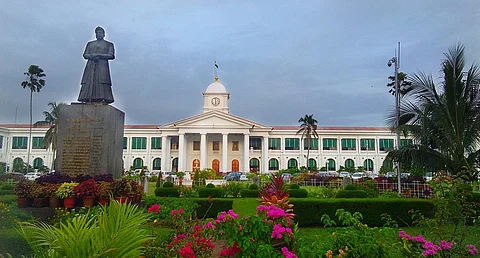

Indian state legislative assemblies continue to meet for less than 30 days on average, according to a new report by PRS, a non-profit and non-partisan organisation.
Assemblies met for 28 days on average in 2017. The number of sitting days of Assemblies came down to 16 during the pandemic affected 2020.
Since then, it has remained close to 20 days a year, according to PRS’ Annual Review of State Laws 2024. Some states have set a target for the minimum number of annual sitting days either through legislation or through Rules of Procedure. None of them have met these targets in any year.
In 2024, state Assemblies met for 20 days on average, as per the report by PRS. The average duration of each sitting was 5 hours.
Odisha met for the highest number of days (42), followed by Kerala (38). Among the larger states, Uttar Pradesh and Madhya Pradesh met for 16 days each. In 2024, states discussed budgets for seven days on average.
Between 2017 and 2024, Kerala met for 44 days on average, followed by Odisha (40) and Karnataka (34).
PRS has been tracking the functioning of state legislatures and India’s Parliament for the last 20 years. It aims to make the legislative process better informed, more transparent, and participatory.
Even more worryingly, the report by PRS found that the office of Deputy Speaker is vacant in eight state Assemblies.
Article 178 of the Constitution requires Assemblies to choose two members as the Speaker and the Deputy Speaker as soon as possible. However, Jharkhand has not elected one for over 20 years. Incidentally, the Lok Sabha too has not had a Deputy Speaker since June 2019.
As far as bills go, states on average passed 17 of them last year. Of the over 500 bills passed, Karnataka passed the highest (49), followed by Tamil Nadu (45). Delhi passed just 1 bill, followed by Rajasthan with 2.
Fifty-one per cent or over 250 of all bills passed, were passed within a day of introduction. Eight states passed all bills within a day of introduction. Jharkhand, Mizoram, Puducherry and Punjab had also passed all bills within a day in 2023 and 2022.
About half of the bills passed relate to education, finance, and local governance. According to the report, some interesting laws enacted during 2024 included the Uttarakhand Uniform Civil Code, West Bengal Aparajita Act (stricter penalty for rape), laws across several states to curb unfair practices in public exams, Haryana’s law to regulate private coaching institutes and Madhya Pradesh’s to regulate private school fees.
Tamil Nadu earmarked welfare spending for scheduled castes and scheduled tribes in proportion to population, while Maharashtra provided 10 per cent reservation for Marathas for education and government jobs. Several states passed laws to levy taxes on mineral rights, following a Supreme Court judgement in July 2024 allowing states to do so.
Gujarat passed laws banning black magic, while Assam banned magical healing practices to treat diseases. Maharashtra increased the penalty for felling a tree without permission.
Chhattisgarh, Karnataka, Punjab and Tamil Nadu amended their Agricultural Produce Marketing laws. Haryana, Karnataka, and Telangana banned hookah bars or serving hookahs in restaurants or bars.